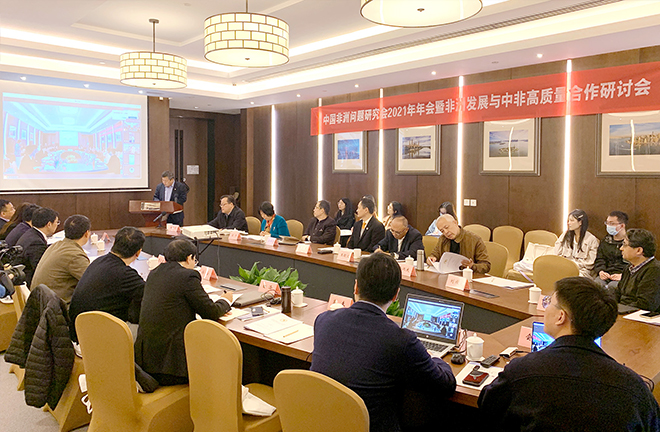China-Africa cooperation brings mutual benefit

The 2021 Annual Conference of the Chinese Research Society of African Affairs and the concurrent Symposium on African Development and China-Africa High-Quality Cooperation in Nanjing, Jiangsu Province, on Nov. 20 Photo: Wu Nan/CSST
NANJING—In October 2000, promoted by China and Africa, the Forum on China-Africa Cooperation (FOCAC) came into being. Under the guidance of the forum over the past 21 years, mutual China-Africa political trust has been deepened, pragmatic cooperation has been expanded in an all-round way, people-to-people exchanges have been unprecedentedly close, and cooperation in the field of peace and security has been steadily advancing.
At the 2021 Annual Conference of the Chinese Research Society of African Affairs and the concurrent Symposium on African Development and China-Africa High-Quality Cooperation in Nanjing, Jiangsu Province, on Nov. 20, the participating scholars are full of expectations that China-Africa cooperation will usher in a new pattern.
The past 21 years has seen achievements in China-Africa practical cooperation, said Fang Yunlong, counselor of the Department of African Affairs of China’s Ministry of Foreign Affairs, in connection with his own experience of being twice stationed in Africa. Numerous projects including railways, highways, airports, ports, and power stations have been successfully implemented, contributing to Africa’s economic and social development.
Ten cooperation plans and eight major initiatives jointly formulated and implemented by China and Africa have pushed practical cooperation to a record high, Fang continued. At this time, all of the ten cooperation plans have been fully completed, and the overall implementation rate of the eight major initiatives has exceeded 90%. A total of 46 African countries as well as the African Union Commission have signed the Belt and Road cooperation documents with China.
China-Africa cooperation has shown a good momentum for transforming from government-led to market operation, upgrading from commodity trade to production capacity cooperation, and moving from project contracting to investment operation, Fang continued. Numerous private enterprises have entered Africa and become a new force in China’s investment in Africa, providing new impetus for local employment and even the realization of Africa’s industrialization.
Wei Jianguo, vice chairman of the China Center for International Economic Exchange, proposed that China-Africa economic and trade relations will see three leaps in the next five years.
First, there will be major changes in China-Africa trade and investment. The bilateral trade volume will increase from the current 200 billion US dollars to 400 billion US dollars. China’s exports to Africa will continue to increase, and it will shift from the existing exports of textiles, primary products, and electronic products to the export of electromechanical products, especially mobile phones, automobiles, airplanes, and high-speed trains.
Second, China’s construction of a new development paradigm will help facilitate Africa’s industrialization. The entry of Chinese private enterprises, including small and medium-sized enterprises, into Africa is the strongest foundation for China-Africa economic cooperation.
In addition, accelerating the construction of a new development paradigm will not only promote Africa’s economy, trade, and industrialization, but also play a greater role in promoting China-Africa cooperation in education, science and technology, culture, sports, and other fields, as well as the joint construction of the Belt and Road. It will promote the overall rapid development of China-Africa cooperation.
Wang Cheng’an, former secretary-general of the Forum for Economic and Trade Cooperation Between China and Portuguese-Speaking Countries (Macao), proposed to explore a new model for China’s aid to Africa, link up with the African Union’s Agenda 2063, and strengthen research on the African economy and society.
Zhang Zhenke, a professor at the Institute of African Studies at Nanjing University, suggested deepening international cooperation and cultural exchanges that serve China-Africa cooperation strategies, while strengthening research on individual African countries, as well as regional research. It is also important to evaluate cooperation with Africa and adjust cooperation projects.
Edited by JIANG HONG
